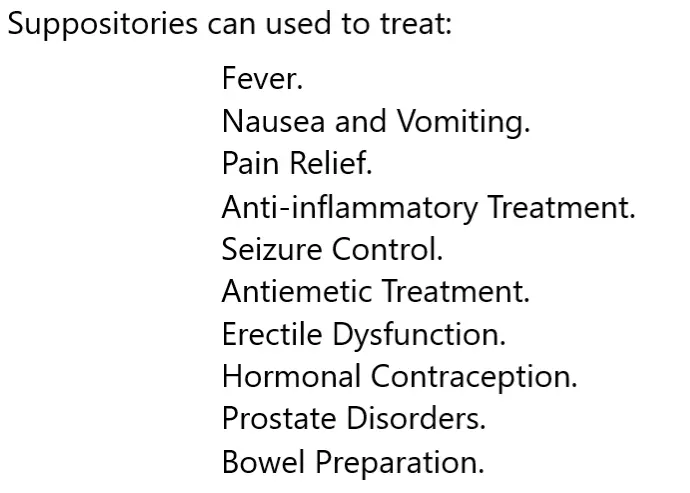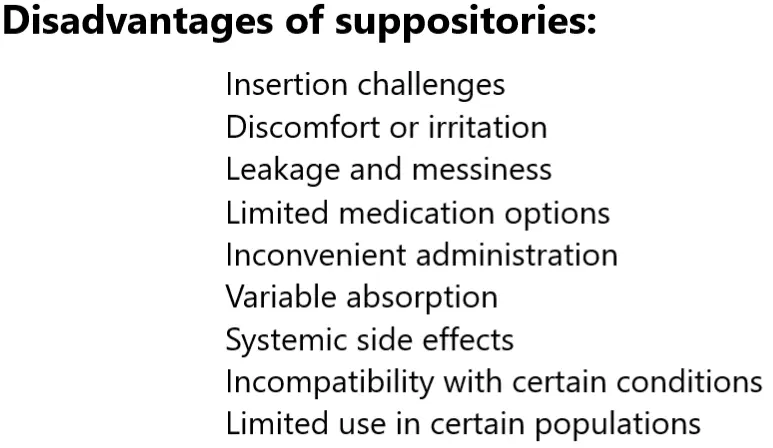Learn what is suppositories? What are the advantages and disadvantages of suppositories? These are using to treat Hemorrhoid, Constipation etc
What are Suppositories?
These are solid or semi-solid medications that are inserted into the rectum or vagina, where they dissolve and release medication for absorption into the bloodstream or for localized treatment.
Uses

- Suppositories can be used to reduce fever.
- They are also effective in managing nausea and vomiting.
- Provide pain relief when oral medications are not suitable.
- Suppositories are an option for controlling seizures in situations where oral administration is not possible.
- They can help alleviate severe nausea and vomiting caused by chemotherapy or other medical conditions.
- Using for managing erectile dysfunction by facilitating erections.
- Hormonal suppositories can serve as a form of contraception when inserted vaginally.
- Use to managing symptoms of prostate disorders, such as benign prostatic hyperplasia (BPH).
- Play a role in bowel preparation before medical procedures like colonoscopy to empty the bowels.
Advantages and disadvantages of Suppositories
Here are the advantages and disadvantages of suppositories.
Advantages of suppositories

- Faster absorption: Suppositories dissolve quickly, entering the bloodstream directly for fast action.
- Bypasses digestive system: Suppositories avoid issues like stomach acid degradation and liver metabolism by being inserted into the rectum or vagina.
- Increased bioavailability: These offer higher availability of certain medications by bypassing degradation in the digestive tract.
- Localized treatment: Medication directly act directly on affected area, ideal for conditions like hemorrhoids or vaginal infections.
- Suitable for patients with nausea or vomiting: These provide an alternative administration route for those who can’t tolerate oral medications due to nausea or vomiting.
- Avoids injection: Suppositories are a non-invasive option, convenient for patients with needle phobia.
- Prolonged drug release: Some suppositories slowly release medication over time for sustained therapeutic effects.
- Pediatric use: Are especially useful for children who struggle with swallowing pills or dislike oral medication.
- Improved compliance: Offer an alternative option for patients who struggle to adhere to oral medication regimens.
- Reduced gastric irritation: Suppositories bypass the stomach, decreasing the risk of gastric irritation or gastrointestinal side effects associated with certain oral medications.
Disadvantages of Suppositories

- Insertion Challenges: Suppositories can be uncomfortable or difficult for some individuals, especially those with limited mobility or conditions that affect manual dexterity.
- Potential Discomfort: Can cause temporary discomfort, itching, or a sensation of fullness in the rectum or vagina during insertion.
- Messiness: Can cause leakage or staining of clothing, particularly if they melt before insertion.
- Limited Medication Options: Not all medications are available in suppository form, which limits the range of treatment options for certain conditions.
- Variable Absorption: The absorption of these medications can vary among individuals, depending on factors such as rectal pH, moisture, and individual variation in rectal or vaginal anatomy.
- Systemic Side Effects: Some medications can cause systemic side effects such as nausea, dizziness, or headache.
- Incompatibility with Certain Conditions: Certain medical conditions, such as rectal or vaginal inflammation or lesions, may make suppository use inadvisable or contraindicated.
- Limited Use in Certain Populations: May not be suitable for individuals with certain conditions such as severe hemorrhoids, rectal prolapse, or active gastrointestinal bleeding.
- Cost: In some cases, these may be more expensive than equivalent oral medications, potentially increasing the overall cost of treatment.
Also read Suppositories definition types uses merits and demerits.
